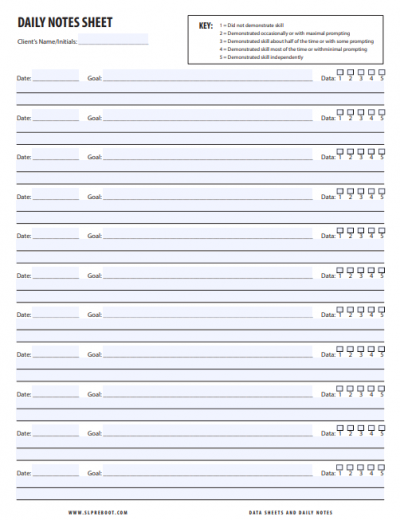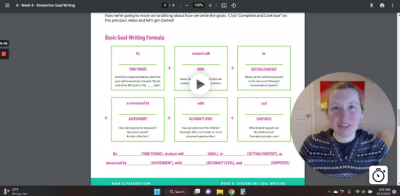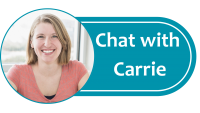The School SLP’s Guide to Getting Organized and Stressing Less
SLPs are Overworked. Who’s Surprised? Anyone??
Did you know that 58% of school-based SLPs say high workload/caseload size is their greatest challenge as a school based professional? And 37% of respondents said it was incorporating optimal service delivery models.
Are you surprised? Are these among your greatest challenges as a school-based speech-language pathologist? If so, you’re in good hands! Today I’m sharing my top tips for helping you streamline, organize, and reduce stress as a school SLP.
The Secret to Saving Time and Reducing Stress as an SLP
Ok, so no one is surprised that SLPs are overworked. But what do we do about it? How do we fix this massive problem of way too many kids who need help and not enough speech-language professionals to go around? Well it’s really not as hard as it seems.
We can’t fix the whole broken system but we can make small tweaks in what we’re doing that will result in us doing more in less time. Think of it like Dave Ramsey’s snowball of getting out of debt. In his method, you pay off one small debt first. Then, with the money you saved from paying off that debt, you work on paying down the next largest debt. As you continue to pay off these debts, you keep funneling that money into paying off more and more debts.
We can do the same with saving time. I can show you a quick way to save a few minutes (or more) per week by making small tweaks to what you’re doing. With the time you’ve saved, you’ll work on tweaking another part of what you’re doing to save more time in that area as well. Eventually, you’ll have saved so much time that you won’t have to take work home anymore and your stress levels will go down tremendously. And it’s totally, do-able! Let’s dive in!
Time Saving Hack Number 1: Switch to No-Prep Therapy
How much time are you spending prepping for your sessions? Are you spending time scouring the internet for the latest fun way to teach that skill? Are you printing? Laminating? Cutting? Setting up cutesy activities? And then how often does that lesson go awry anyway and it didn’t end up being as good as you thought? Are you finding it hard to keep track of all of the activities and materials you’ve purchased over the years?
Imagine cutting that time to zero.
For some of you, this might save a HUGE amount of time. But how do we do that? How can you do speech/language therapy with NO prep time at all? Simple, follow the child’s lead.
How to Follow the Child’s Lead for No-Prep Therapy
Your therapy space (or bag if you’re traveling) should be stocked with a nice selection of activities that your clients enjoy. These can be games, crafts, puzzles, toys, etc. Allow the child to pick on activity and then figure out how to work on your target skill during that activity, in the moment. That might mean having them think of 5 words that contain their target sound in between turns. It could be having them use correct grammar while describing what their doll is doing during play. It could be having them use their fluency-shaping strategy while teaching you how to play a game on your phone/tablet.
Here are some great examples of therapy activities with no materials!
Need some more information about how to do therapy with no prep time and no materials? Check out our SLP Reboot Course inside The Speech and Language Kids Hub!
Time Saving Hack Number 2: Switch Your Service Delivery Model
Now that you’ve saved a bunch of time by not prepping each and every session, let’s spend that time switching to a more optimal service delivery model. A service delivery model is how we provide services to children in terms of frequency and duration. Are you seeing children 30 minutes twice weekly? 5 minutes daily? 30 minutes three times per month? There are several different service delivery models and some are more suited to saving you time than others.
5-Minute Therapy Sessions
The 5-minute session is by far my favorite. The research shows that when used correctly, children can make faster progress in less time by switching to 5-minute individual sessions (more frequent) instead of 30-minute group sessions (less frequent). I’ve personally seen it in my own caseload as well! Obviously, not every child will be a great fit for this model, but if you’re working on a skill that lends itself to drill and practice, 5-minute sessions are great.
The idea is to cram as many repetitions of the skill into 5-minutes as possible, then you send them back to class. They miss less class time and since it’s only 5 minutes long, you don’t need to play games and plan activities to keep them engaged. You’ll also see fewer behavior challenges due to the shortened session. We do these 5-minute sessions 3-5 times per week and that’s it!
Don’t believe me? Check out how many repetitions I got in during this 5-minute mock session with my son:
The 3:1 Service Delivery Model for SLPs
In the 3:1 service delivery model, we provide 3 weeks of direct services for our clients and then we spend one week of every month on “indirect minutes”. These can be used to check in with classroom teachers and parents, observing the child in the natural setting, creating resources to help the teacher carry over skills into the classroom, and anything else that needs to be done to make sure the child is improving outside of your therapy sessions. This gives us and the child a breather (which often the children need) while we work on the parts of our job that aren’t student-facing. Because there’s a lot more to it than just going to see your SLP every week.
Need help figuring out how to transition to one (or both) of these service delivery models? Check out our SLP Reboot Course inside The Speech and Language Kids Hub!
Time Saving Hack Number 3: Take Less Data
You heard me! You’re taking too much data!
I know, I know, data is EVERYTHING! Without good data we can’t know if our therapies are working and how we should modify our instruction. But I’m not suggesting you get rid of data entirely, but if you’re taking data on every rep the child produces, you’re probably doing too much. (Unless your boss is making you…in which case you need to have a long talk with your boss about the best uses of your time.)
Most of our clients don’t make such fast progress that we need to collect in-depth data during every session. For most of our clients, taking full data once per month will be enough to give us a picture of how they’re doing and whether or not our strategies are working. So I recommend you collect data on every rep during your last session of the month only.
So what do you do during those other sessions? If you want to jump all the way in and take no data at all, go for it! But most of us at least need a brief reminder of what we did and how it went. I know I can’t keep track of all of those kids in my head! So here’s my recommendation for your daily data:
How to Collect Simplified Daily Notes
Each day that you’re not collecting full data, jot down this:
- The date
- What skill you worked on
- How they did on a scale of 1-5
- A quick note to self (like if a specific cue worked well)
That’s it! You can write this down in about 30 seconds and it can be done right during your session, maybe while they’re taking their turn in the game. You’ll still have a numeric score in case you need that for billing and you’ll remember what you did. But you won’t be spending all of your time and brain power on collecting data. That leaves you more mental space to do the actual therapy. You know, that stuff we do to actually help kids improve?? Let’s do more of that!
Download my Daily Notes Page for Free!
Need a quick and easy way to make this happen? Check out my very simple daily notes page here. You can download this and use it to collect your data. This is from our SLP Reboot Course! Inside the course, we show you exactly how to streamline and simplify all aspects of your job. Plus, we give you handy tools like this to make it easy.

Download this Rubric-Style Daily Notes Page for Free!
Time Saving Hack Number 3: Join The Speech and Language Kids Membership!
Have you heard of our membership at The Speech and Language Kids Hub? Not only does it have amazing courses, training videos, and no-prep therapy materials, but it also now includes our SLP Reboot for free! The SLP Reboot is our organization course that will walk you through exactly how to make each of these time-saving tips work.
The SLP Reboot includes these three tips along with three more:
- Streamlining your Goal Writing
- Streamlining your Paperwork and Admin Tasks
- Organizing your Space and Materials
Let me take you down this path together. I’ll help you get organized and STAY organized!
Click Here to Join The Hub and Get our SLP Reboot Organization Course for Free!

About the Author: Carrie Clark, MA CCC-SLP
Hi, I’m Carrie! I’m a speech-language pathologist from Columbia, Missouri, USA. I’ve worked with children and teenagers of all ages in schools, preschools, and even my own private practice. I love digging through the research on speech and language topics and breaking it down into step-by-step plans for my followers. I graduated from Truman State University in Kirksville, MO with a masters degree in Communication Disorders.
Fun Fact: I LOVE getting organized, but I absolutely suck at sticking with it. Over the years I’ve tried a ton of different ways to organize my house, my work, and my life. But within a few weeks, all of my fancy systems tend to fall apart. Fortunately, I’ve used this as a learning experience that I’m not using to help you as well! After WAY too many failures, I have honed in on the organization systems that are less likely to be abandoned. The simpler I keep the system, the more likely I am to stick with it. And that’s what I’ve created with The SLP Reboot as well. I’ve shown you how to simplify down so that your new organization systems will be easier to maintain!
Connect with Me:








Thank for sharing these information. It’s great for me.
I truly hope you will keep sending me stuff like this because I think your essay is really informative and interesting.